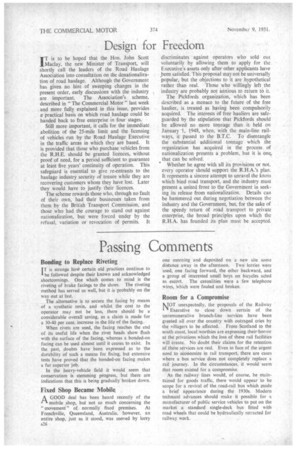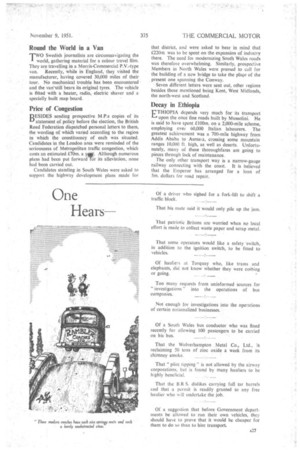Passing Comments
Page 28

Page 29

If you've noticed an error in this article please click here to report it so we can fix it.
Bonding to Replace Riveting
I T is strange bow certain old practices continue to
be followed despite their known and acknowledged shortcomings. One which comes to mind is the riveting of brake facings to the shoes. The riveting method has served us well, but it is probably on the way out at last.
The alternative is to secure the facing by means of a synthetic resin, and whilst the cost to the operator may not be less, there should be a considerable overall saving, as a claim is made for a 30-40 per cent. increase in the life of the facing.
When rivets are used, the facing reaches the end of its useful life when the rivet heads show flush with the surface of the facing, whereas a bonded-on facing can be used almost until it ceases to exist. In the past, doubts have been expressed as to the durability of such a means for fixing, but extensive tests have proved that the bonded-on facing makes a far superior job.
In the heavy-vehicle field it would seem that conservatism is stemming progress, but there are indications that this is being gradually broken down.
Fixed Shop Became Mobile
A GOOD deal has been heard recently of the r-k mobile shop, but not so much concerning the
" movement " of normally fixed premises. At Frenchville, Queensland, Australia, however, an entire shop, just as it stood, was moved by lorry A26 one morning and deposited on a new site some distance away in the afternoon. Two lorries were used, one facing forward, the other backward, and a group of interested small boys on bicycles acted as escort. The casualities were a few telephone wires, which were fouled and broken.
Room for a Compromise
mar unexpectedly, the proposals of the Railway " Executive to close down certain of the up remunerative branch-line services have been greeted all over the country with outraged cries by
the villagers to be affected. From Scotland to the south coast, local worthies are expressing their horror at the privations which the loss of these rail facilities will create. No doubt their claims for the retention of these services are real. Even in face of the urgent need to economize in rail transport, there are cases where a bus service does not completely replace a rail journey. In the circumstances, it would seem that room existed for a compromise.
As the railway lines would, of course, be maintained for goods traffic, there would appear to be scope for a revival of the, road-rail bus which made a brief appearance during the 1930s. Modern technical advances should make it possible for a manufacturer of public service vehicles to put on the market a standard single-deck bus fitted with road wheels that could be hydraulically retracted for railway work.
Round the World in a Van
'f TWO Swedish journalists are circumnavigating the 'WO gathering material for a colour travel film.
They are travelling in a Morris-Commercial P.V.-type van. Recently, while in England, they visited the manufacturer, having covered 30,000 miles of their tour. No mechanical trouble has been encountered
• and the van-still bears its original tyres. The vehicle is fitted with a heater, radio, electric shaver and a specially built map board.
Price of Congestion
ESIDES Ssending prospective M.P.s copies of its LI statement of policy before the election, the British Road Federation dispatched personal letters to them, the wording of which varied according to the region in which the constituency of each was situated. Candidates in the London area were reminded of the seriousness of Metropolitan traffic congestion, which costs an estimated £70m. a yir. Although numerous plans had been put forward or its alleviation, none had been carried out.
Candidates standing in South Wales were asked to support the highway development plans made for that district, and were asked to bear in mind that £220rn. was to be spent on the expansion of industry there. The need foi modernizing South Wales roads was therefote overwhelming. Similarly, prospective Members in North Wales were pressed to call for the building of a new bridge to take the plape of the present one spanning the 'Conway.
Seven different letters were sent out, other regions besides those mentioned being Kent, West Midlands, the north-west and Scotland.
Decay in Ethiopia
ETHIOPIA depends very much for its transport
upon the once fine roads built by Mussolini. He is said to have spent £100m. on a 2,000-mile scheme, employing over 60,000 Italian labourers. The greatest achievement was a 700-mile highway from Addis Ababa to Asmata, crossing some mountain ranges 10,000 ft. high, as well as deserts. Unfortunately, many of these thoroughfares are going to pieces through lack of maintenance.
The only other transport way is a narrow-gauge railway connecting with the coast. It is believed that the Emperor has arranged for a loan of 5m. dollars for road repair.




















































































